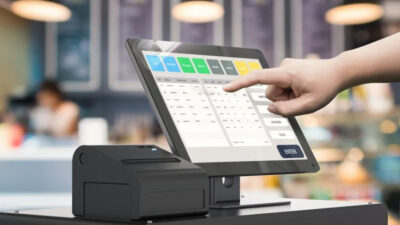POS systems are essential for optimizing operations, boosting revenue, and delivering outstanding customer experiences in the fast-paced business world of today. In addition to processing payments, a contemporary point-of-sale system combines key company operations like data analytics, inventory control, customer relationship management, and staff scheduling into a single, seamless platform.
Selecting the best point-of-sale (POS) system is essential to optimizing POS company efficiency and future-proofing your operations, regardless of whether you’re managing a busy restaurant, a tiny retail store, or an online store. This is how point-of-sale (POS) systems can help your business and what factors to take into account when choosing a system that meets your needs and objectives.

How Modern POS Systems Improve Business Efficiency
By combining several procedures, a contemporary point-of-sale system is a comprehensive instrument that improves POS business productivity. Here’s how:
Transaction Processing:
Credit/debit cards, mobile wallets, and even cryptocurrencies may be processed quickly and securely through modern point-of-sale (POS) systems. This improves the customer experience and guarantees quicker checkout times.
Inventory Management:
A lot of point-of-sale (POS) systems provide for real-time inventory tracking, which guarantees that stock levels are updated immediately in response to sales. Profitability may be impacted by stock outs and overstocking, which are avoided in this way.
Data Analytics:
Point-of-sale (POS) systems that come with integrated analytics offer useful information on consumer preferences, sales patterns, and inventory performance. Businesses can use this information to make well-informed decisions on product inventory, pricing, and promotions.
Employee Management:
By tracking employee sales performance, hours worked, and even shift scheduling, point-of-sale (POS) systems lower administrative costs and increase worker productivity.
By consolidating these core functions into a single, user-friendly platform, modern POS solutions allow businesses to operate with greater speed, accuracy, and insight.
Future POS Technology: What’s Next for the Industry?
POS systems are always evolving along with technology. The following are some of the developments and trends influencing POS technology going forward:
Cloud-Based Solutions:
With its scalability, flexibility, and ease of use from any location with an internet connection, cloud point-of-sale (POS) systems are becoming more and more popular. This makes it possible for business owners to oversee their activities from a distance and guarantee that data is secure and up to date.
AI and Machine Learning:
In order to deliver predictive analytics, POS systems are integrating AI and machine learning. Businesses can use these technologies to estimate demand, optimize inventory, and provide tailored customer recommendations based on past purchases.
Mobile and Tablet POS:
As mobile commerce expands, more companies are using mobile-friendly tablet-based point-of-sale systems, which make it easier for employees to process transactions on the floor or at events, enhancing customer convenience.
Contactless Payments:
The rise of mobile wallets like Apple Pay and Google Pay and others has led to increased adoption of contactless payment methods. Future POS systems will continue to support these touch-free transactions, ensuring faster and more secure payments.
Integrated eCommerce:
As e-commerce grows, POS systems are becoming more integrated with online shopping platforms. This enables businesses to manage both in-store and online sales from a single interface, ensuring a consistent customer experience across channels.
Blockchain and Cryptocurrency:
As cryptocurrency becomes more mainstream, POS systems will likely integrate blockchain technology for secure, decentralized transactions, enabling businesses to accept digital currencies like Bitcoin or Ethereum.
Key Takeaways: Enhancing Efficiency with POS Systems
Efficiency:
Modern POS systems automate key business functions like sales transactions, inventory management, and customer tracking, reducing manual errors and saving time.
Insights:
With integrated reporting and data analytics, POS systems help businesses understand customer behavior, track sales performance, and optimize operations.
Growth:
As your business expands, scalable POS solutions can grow with you, offering more advanced features and better integrations as needed.
Security and Compliance:
Ensuring your POS system is secure and compliant with industry standards is critical to protecting both customer data and your business from potential fraud.
Adaptability:
Future POS technology, including AI, mobile solutions, and blockchain, promises to further enhance business efficiency, providing more personalized services and smoother operations.




